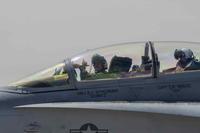You remember "transformation." And "balance." Well now there's a new buzzword in town, and it goes like this: "reversibility."
That is the doctrine born of Thursday's comprehensive strategic review, which calls for DoD to be mindful that anything it stops, delays, breaks or undoes, it needs to be able to restart, accelerate, repair and redo.
"The concept of ‘reversibility' — including the vectors on which we place our industrial base, our people, our active-reserve component balance, our posture and our partnership emphasis — is a key part of our decision calculus," DoD's new strategy said.
Adm. Sandy Winnefeld, vice chairman of the Joint Chiefs of Staff, said it would be DoD's focus on "avoiding departmental hubris." Deputy Secretary of Defense Ash Carter invoked former Secretary Gates' warnings that "we might get it wrong."
This is an official-language adoption of something we heard a lot last year from defense and aerospace industry advocates -- that cutting too much, or not being mindful about the long-term consequences of eliminating certain programs, could mean they might go away forever. Or cutting something today could make getting it back so much more expensive that a future Pentagon or future Congress might balk.
Even before we had "reversibility" under this name, it's the basic argument for why the Aerospace Industries Association and other groups wanted DoD to have an "industrial strategy," to determine what should, can and must survive. If the Army stops buying socks, it can probably start buying them again in big quantities without too much inconvenience. But if it eliminates Brigade Combat Teams, it should so with a view toward theoretically reconstituting them sometime down the road.
Nowhere would "reversibility" seem to apply more than to combat aircraft. As we heard last year, the defense industry is worried about the future of its advanced design teams, which today, for the first time in years, have no new-generation manned fighter to work on or fight over. There's the Air Force's new bomber, sure, but that's not going to be enough gruel to around. Under "reversibility," Northrop Grumman, Lockheed Marin, Boeing, General Dynamics and others could argue that they need subsidies to keep around at least a kernel of their advanced teams, in case the U.S. wants new tactical aircraft for tomorrow.
"Reversibility" even applies to concepts, such as counterinsurgency warfare. DoD's strategy Thursday said it will no longer preserve the standing force structure for "large-scale stability operations," but it'll institutionally remember how to do them, officials promised. That way the U.S. can just plus up its ground forces as needed and dust off its COIN handbook in time for America's inevitable next Asian land war. See? Easy!
It may not be long before the brand-name contractors and Hill advocates begin describing potential cuts to their programs or pet projects as "irreversible," much as the sexy programs of yesteryear all became "transformational." "Irreversible" would have made sense before, but now that it's in the official lexicon, users may hope it gives them a little extra sparkle.








